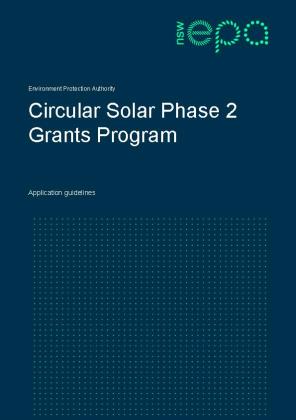Program snapshot
Category: Circular solar
Amounts: Available funds have been exhausted
Eligible bodies: Business, not-for-profit organisations, councils, research institutions, government agencies and organisations.
Contact: Waste and Recycling Infrastructure Unit by phone on (02) 9895 6486 or infrastructure.grants@epa.nsw.gov.au
Status: Closed.
Managed by: NSW Environment Protection Authority
Aims
It is forecast that NSW will generate 3,000–10,000 tonnes per year of waste solar PV panels and battery storage systems by 2025, rising to 40,000–71,000 tonnes per year by 2035. To prepare for this emerging waste stream, the Circular solar grant program supports collaborative ‘whole-of-supply chain’ projects that trial managing end-of-life solar panels and/or battery systems within a circular economy framework.
Available funding
The NSW Government created a $10 million fund to reduce landfilling of solar panels and battery systems. This investment is intended to future-proof the management of this growing waste stream and help NSW transition to renewable energy sources within a circular economy. Remaining funds under Circular Solar are reserved as a support program for product stewardship and circular economy research.
Phase 1 of the Circular Solar grants program (trial phase) awarded $2.1 million in funding for eligible trial projects.
Phase 2 of the Circular Solar grants program awarded $7.4 million in funding for eligible projects.
Phase 2 grant recipients - 2022
Blue Tribe Co. Pty Ltd
$404,900
The Second Life Solar Stage 2 project will develop a new whole-of-supply chain business model and secondary marketplace that will divert serviceable decommissioned solar panels from landfill for reuse in community solar gardens. The project will engage with consumers to recover solar panels destined for the waste stream and test them (using a new rapid and portable testing apparatus) to identify those that are serviceable and those that have reached the end of lives. The serviceable panels will be used to create a commercial scale (~100kW) ‘second-life’ solar system. The demonstration solar garden will be hosted in Wagga Wagga NSW. The project has the potential to divert 10,000 tonnes per annum of reusable end-of-life solar panels by 2030. The project will also engage with key actors in the solar industry with a view to advancing actions to address regulatory and related barriers to the reuse of second-hand solar panels.
PV Industries Pty Ltd
$2,371,581
PV Industries will support the establishment of a viable circular economy for solar panels, their lithium-ion batteries and inverters in NSW. The project is closely aligned with circular economy principles, promoting solar panel and inverter reuse, repair and refurbishment, and diversion from landfill through end-of-life processing.
PV Industries will scale-up their processing technology, establishing a high-capacity solar panel and lithium-ion battery recycling facility in Bankstown NSW, capable of processing up to 8,000 tonnes per annum, and expand their metro and regional collection and logistics network. This will lead to increased access to services and diversion from landfill in the Bankstown area. The project will also improve collection and logistics for li-ion batteries. A process for onshore warranty support, reuse, repair and refurbishment of solar inverters will be implemented.
Sircel Limited
$1,719,000
Sircel will establish a solar panel recycling facility in Parkes NSW, that will employ the most advanced and commercially proven solar panel processing technology available globally. The objective of the project is to process up to 2,000 tonnes per annum of solar panels and ancillary equipment to achieve a commodity recovery rate of more than 90%. The proposed facility will offer a commercially viable and sustainable solution for the recovery and recycling of valuable resources from end-of-life solar panels, and Sircel will also employ its sophisticated waste tracking system to demonstrate the reintroduction of recovered raw materials to the NSW economy.
The project includes partners across the NSW end-of-life solar panel value chain, including collection and logistics specialists, local councils, utility-scale solar power generation owners, operators and asset mangers, solar panel installers, research and development, and technical advisory board, and Sircel accredited downstream commodity off-takers.
SK tes Sustainable Battery Solutions (Australia) Pty Ltd
$1,913,517
SK tes proposes NSW local capability in circular lithium-ion battery re-use and recycling, leveraging its internationally expertise, client relationships and local strategic partnerships. This new plant will address grant priorities and looming waste dilemmas for lithium-ion waste from solar panel batteries. Through collaboration, the project will complement rather than duplicate already emerging infrastructure that is being established in solar panel recycling and the collection network being built around these products and the B-cycle scheme. This facility will be the first of its kind in NSW and Australia, processing up to 1,000 tonnes per annum of lithium-ion batteries, 400 tonnes per annum from solar panel systems. The facility is to be located in Newcastle NSW. The project will deliver additional 20 green jobs, knowledge sharing around systems, processes and standards, access to international markets for battery materials and encourage the circular economy through reuse.
University of New South Wales
$1,000,000
The research and development project aims to develop highly efficient, mobile and flexible recycling technology to recover valuable metals, glass, and silicon from end-of-life solar panels, through leveraging University of New South Wales, Sydney University and University of Technology Sydney interdisciplinary research expertise of reactor and system design, solar panels, catalysis, metallurgy etc and collaborating with leading solar industry across the supply chain. The project is internationally innovative, advanced, and will be technically achieved by combining computer modelling for reactors design and scale-up, experiments for chemistry/catalysis design, and system prototyping for effectiveness demonstration with technology assessments.
After lab-scale fundamental studies, the reactors will be scaled-up to pilot and then virtually trialled through simulations to industry-scale for fitting into transportable containers with an optimised layout. The expected outcomes include lab-scale prototypes and a virtual industry-scale system. The project targets more than 95% silver, copper, silicon and glass recovery; energy consumption at less than 30kwH/kWp; stable-run greater than 8 hours. The up-scalable computer models, and technology assessment, will provide a competitive and sustainable solar panel recycling solution towards NSW circular economy.


